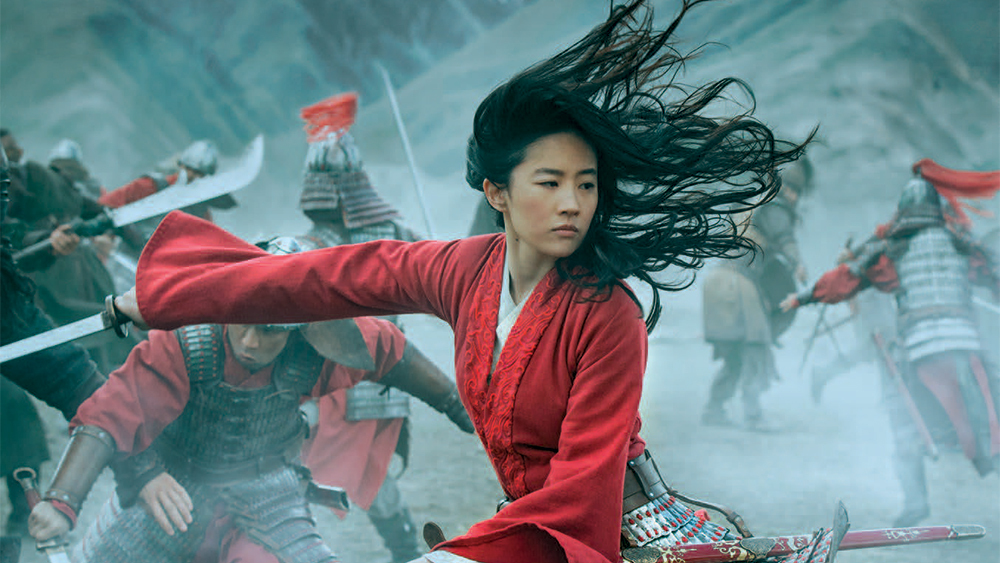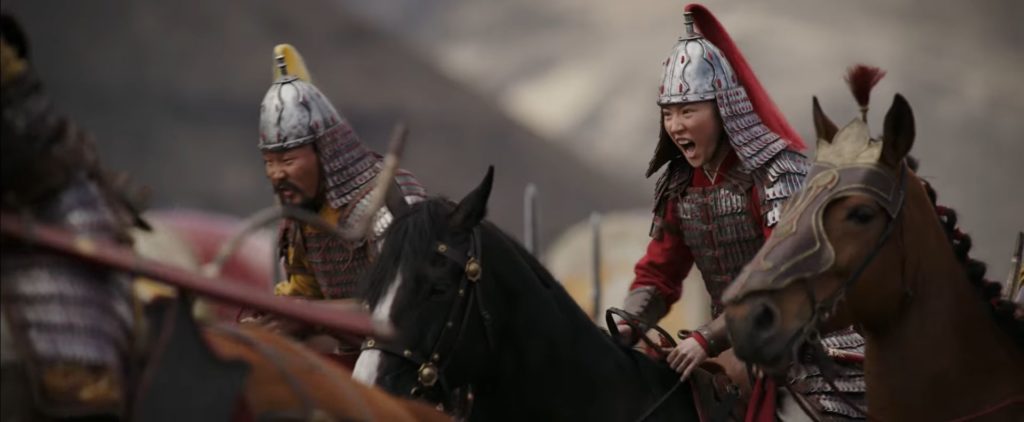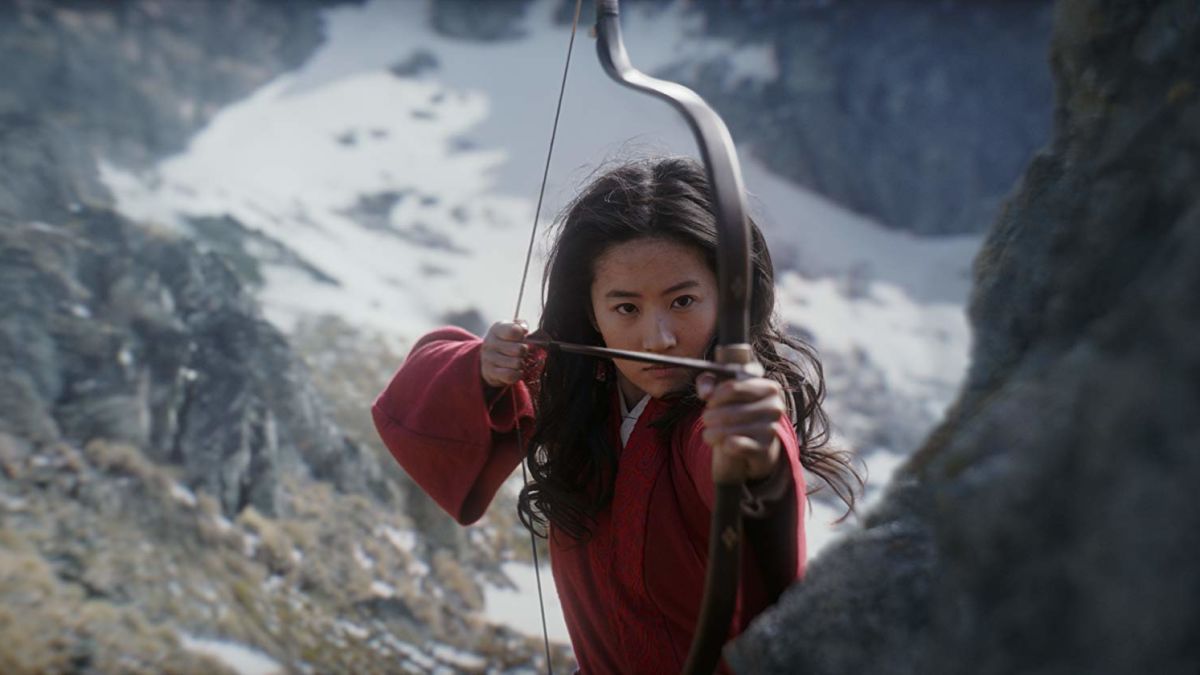 By Jacob Sahms
By Jacob Sahms
The live-action remake of Walt Disney’s animated classic from 1998, Mulan, bears the main spirit or the marks of the original while also carving more than a little new ground. Mulan (Liu Yifei) stands in for her father, who is too old and too feeble to take his familial spot in the conscripted Imperial Army of the Emperor of China, going undercover as a man named Hua Jun to fight against northern invaders led by a female shapeshifter, Xian Lang (Gong Li). Mulan has the power of Chi – some might compare it to the Force or the Last Airbender’s energy bending- but the battle for China will ultimately come down to the question of one woman’s character.
The action directed by Niki Caro is stunning, and the visuals by cinematographer Mandy Walker (Hidden Figures, The Mountain Between Us) are a feast for the eyes. While my older son found the absence of Mushu, Eddie Murphy’s dragon in the original, to be objectionable, it was the lack of musical numbers that stood out as the greatest difference. For the most expensive film directed by a woman (ever), it certainly appears that Disney found a perfect match to tell the coming-of-age story of Mulan.
 While Mulan’s Chinese background brings with it ancestor worship and the spiritual warfare between good and evil, the metaphors directly correlate to the Christian faith. Early on, like every orphan in other Disney films (isn’t it shocking that in neither version, Mulan’s father dies?), Mulan precociously shows up adults, while dancing through the village and up the walls after a chicken. Her ability to fight, provide spellbinding aerobatics and more are considered all aspects of the Chi, her father tells her she must hide her gifts to not dishonor herself or her family … because she’s a girl. Whether it’s a parable from Jesus (Matthew 25:14-30) or the authors of the Epistles (I Peter 4:10, Romans 12:6, etc.), we are often reminded of the way we’ve been given gifts for the service of God and other people. This “hiding” of her talents reflects a double-standard for Mulan, but isn’t the last one: by entering and serving the Emperor and her family by pretending to be a girl, she has supposedly done more damage than if she had allowed the whole enterprise to fail by NOT using her gifts.
While Mulan’s Chinese background brings with it ancestor worship and the spiritual warfare between good and evil, the metaphors directly correlate to the Christian faith. Early on, like every orphan in other Disney films (isn’t it shocking that in neither version, Mulan’s father dies?), Mulan precociously shows up adults, while dancing through the village and up the walls after a chicken. Her ability to fight, provide spellbinding aerobatics and more are considered all aspects of the Chi, her father tells her she must hide her gifts to not dishonor herself or her family … because she’s a girl. Whether it’s a parable from Jesus (Matthew 25:14-30) or the authors of the Epistles (I Peter 4:10, Romans 12:6, etc.), we are often reminded of the way we’ve been given gifts for the service of God and other people. This “hiding” of her talents reflects a double-standard for Mulan, but isn’t the last one: by entering and serving the Emperor and her family by pretending to be a girl, she has supposedly done more damage than if she had allowed the whole enterprise to fail by NOT using her gifts.
In the PG-13 version of Mulan, audiences see more of the devastation of real battle – soldiers fall in battle, bloodlessly for the most part, while also having moments where Mulan must hide her true self as her compatriots in the army shallow or dive into a nearby lake. Still, it’s skillfully, tastefully done, showing how Mulan has to hide all of herself — even the funny, courageous, and smart parts of herself. That is, until everything depends on her action and voice, like Esther, showing up in King Xerxes’ palatial throne room “for such a time as this” (Esther 4:14ff). In fact, the outcome is as much about what she says to others and models by example, proving that no one is out of the reach of a change of heart and redemption.
 While “there is no courage without fear” is the tagline of the film, “devotion to family” is the element that shone through in this screening of the film. There’s a matter of character here that stands out because Mulan took on the disgrace of doing the right thing even though it broke the rules, preparing herself to be sacrificed in the name of saving her family and her country. She ultimately proves to be a Christ figure in doing so, willing to “lay her life down for her friends” (John 15:13), even though she is actually blameless in the face of what the country actually needs. By shining a light on family and sacrifice, Mulan ends up setting a standard that her colleagues can see and emulate — men learning from a woman about what it means to lead and be truly loving. (As a quick aside: it’s a remarkable lesson to see these same men use their privilege to back Mulan up when she needs it because they have seen her character — a true example of being an ally, wrapped in a Disney film.)
While “there is no courage without fear” is the tagline of the film, “devotion to family” is the element that shone through in this screening of the film. There’s a matter of character here that stands out because Mulan took on the disgrace of doing the right thing even though it broke the rules, preparing herself to be sacrificed in the name of saving her family and her country. She ultimately proves to be a Christ figure in doing so, willing to “lay her life down for her friends” (John 15:13), even though she is actually blameless in the face of what the country actually needs. By shining a light on family and sacrifice, Mulan ends up setting a standard that her colleagues can see and emulate — men learning from a woman about what it means to lead and be truly loving. (As a quick aside: it’s a remarkable lesson to see these same men use their privilege to back Mulan up when she needs it because they have seen her character — a true example of being an ally, wrapped in a Disney film.)
If there’s a message needed in today’s politically and COVID-divided world, it’s this: when faced with a choice between dignity and service, we’re called to serve and sacrifice with the gifts we’ve been given, whether those we serve honor us in return or not.




